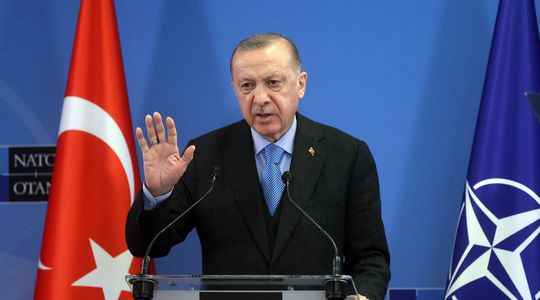The NATO summit in Madrid was to celebrate the great return of the Atlantic Alliance, Western unity rediscovered in the face of the Russian enemy and its unfailing support for the Ukrainian ally. The allies were also to welcome two new members at the end of June, Sweden and Finland, neutral countries for more than sixty years. In summary, this summit was to mark the end of NATO’s “state of brain death”, deplored by Emmanuel Macron in 2019. But a member of the alliance comes to spoil the party, always the same.
Recep Tayyip Erdogan does not disarm. Alone, the Turkish president blocks the membership of the Scandinavians, guilty in his eyes of “protecting the terrorists of the PKK”, a Kurdish armed organization. Finns and Swedes will have to attend the Madrid meeting from the stands, spectators of the major changes initiated by the thirty members of the military alliance.
Despite the Ukrainian context and the imperative unity in the face of threats from the Kremlin, the king stay on his line. His intransigence enabled him to put his country back at the heart of the discussions and to recall its contribution to the Atlantic Alliance. In addition to the size of its army, the second largest NATO contingent, Turkey also controls the access straits to the Black Sea, which are strategic for the war in Ukraine. “Since the failed coup of 2016 and Erdogan’s fierce criticism of the West, Turkey has been poorly perceived by NATO, underlines Bayram Balci, director of the French Institute for Anatolian Studies in Istanbul. This has not been the case since the beginning of the Ukrainian crisis: the NATO countries now understand how important this country is in their alliance. We must put ourselves in the place of the Turks, who must also think of their interests and their security.
Russia, a real threat to Erdogan’s Turkey
More than Western reprimands, Ankara fears the Russian presence on its doorstep, in Syria and the Black Sea. Turkey must come to terms with this troublesome neighbor and avoid any provocation. “NATO is a club responsible for guaranteeing the security of all of its members, believes Bayram Balci. If Turkey accepts the entry of Sweden and Finland, it risks attracting the wrath of Moscow. If Russian troops attack the city of Idlib, Syria, they could cause two million refugees to flee to Turkey, and no one in Europe seems to perceive the magnitude of this threat.”
The calculation of the Turkish leader is already earning him points, at least in terms of communication. The Secretary General of NATO, Jens Stoltenberg, continues to praise the importance of his country for the Alliance and the qualities of the leader Erdogan. Western leaders have even decided to devote several hours on Thursday to assessing “the threats on NATO’s southern flank” – that is, those weighing on Turkey – and “the fight against the terrorism”. The perfect opportunity for Erdogan to castigate the PKK and to repeat his conditions for the accession of Scandinavians. Turkish diplomacy relishes these small victories, which it describes as a “significant moment” for the country’s place on the international scene.
This Turkish blackmail against NATO presents little risk for the moment. No procedure is planned to dismiss or even sanction a member of NATO, and Turkey has already suffered an embargo on certain arms since its purchase of the Russian S-400 air defense system in 2017. Why, then, would Erdogan want to he fall into line?
